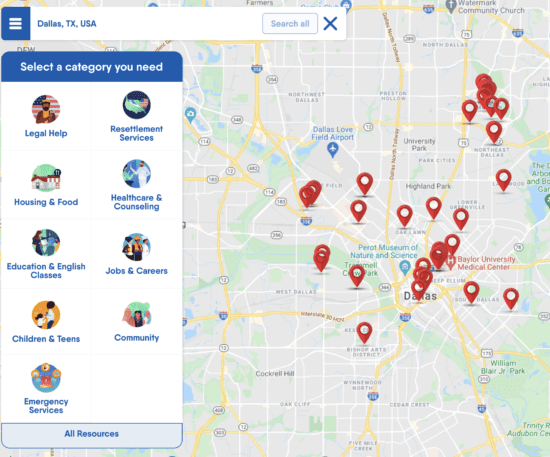School in the USA
School is where children spend the most time in the USA. In school, they can learn new things, make friends, and advance their education. This is also where they can learn language and culture.
It is important for you to help your child during this change. You might not know English well, but there are many ways you can help your child. And you can show them how to help themselves! Here are some ideas to help you help your child in school.
Tips for all ages
There are a few things that parents can do to help a child in school of any age.
Ask your child about their feelings
A child in school will not always talk about how he or she is feeling. They might be having a hard time, but they may not want to worry you. Ask them often how they are feeling. They are more likely to tell you about their problems if you ask.
Watch out for warning signs
If your child seems depressed or stops talking to you about school, he or she may be having a hard time. Continue to ask questions carefully and patiently to encourage your child to talk to you. Stay in touch with his or her teachers and school, so you know what is going on. It is part of their job to help with problems.
If you are worried about your child’s mental health, you can ask for help. Start with the National Parent Helpline. It has trained people who can give you support and advice by phone at 855-427-2736, Monday to Friday, 10 am PST to 7 pm PST. It also has many online resources.
Visit the school with your child
It is hard to start at a new school. Visit the school with your child before the first day of school. This can help your child feel less confused or lost on their first day.
Find out about sports and other activities
Many children in the USA play sports in teams. Others join clubs or play music after school. Find out if your child is interested in any activities. Sports will help keep them healthy and make friends.
Buy or find materials
Try to buy the books and supplies your child needs before school starts. If you cannot afford supplies, talk to your child’s teacher. They will tell you where to get help with supplies.
Be honest with teachers
U.S. schools are concerned with children’s welfare as well as with their education. Also, teachers in the U.S. are very direct. They may want to talk to you about any behavior problems. You can support your child and the teacher by talking honestly about problems and finding solutions.
For a very young child in school, they may talk about issues with their bodies. For example, a preschool teacher might tell you your child is having stomach trouble or has a rash. If this makes you uncomfortable, remember that the teacher is trying to help your child.
(https://www.youtube.com/watch?v=cbjxdPncdEs)
Get tutoring support
Tutoring is extra help outside of regular class where a student gets help understanding a subject better. An adult, teacher, or another student may be able to tutor a student. Some schools have programs after school or during certain classes for students to receive tutoring.
Tutors can help with any subject. Some tutors charge money, but there are also free options through local organizations, religious communities, or after-school programs.
There may be organizations just for helping refugee and immigrant students. Your school office may have a list of private tutors and free tutoring nearby.

Find legal help, English classes, health clinics, housing support, and more. Search a local map and list of services for immigrants in the USA with the app FindHello.
Support for immigrant families
Some schools have a community or cultural liaison who can advocate for immigrant families. You can also ask the school for help with translations for school documents or meetings.
Understand parent and student rights
You have the right to speak up for your child’s needs no matter what your immigration status is. Your child also has rights as a student protected by federal and state laws.
Learn about the rights of immigrant students.
Daycare and preschool
Children can start daycare when they are babies. Some daycares will take children who are only 2 months old. Children are usually 4 or 5 years old when they start kindergarten. This is when they need the most help.
Prepare your child for social interactions
Encourage playdates with other children. Look for ways to help your child develop social skills.
Familiarize your child with routines
Help your child practice separation by spending short times away from home, if they have separation anxiety. You can also help your child get used to waking up early and getting ready for school before the school year starts.
Find clothes and shoes that are easy to put on and take off
Teachers in preschool and daycare teach many children to dress and help them when they can’t. When clothes are easy to take off, you are helping both the child and the teacher.
Set the same schedule as the school
If your child takes a nap or has quiet time at school, do the same at home. It will make it easier for them to follow the school routine.
Read together
Reading is a good habit to start when your children are young. Reading helps your child do well in school. Try to read to your child a few times a week and at bedtime. If you do not know English well, find picture books and ask your child to tell you what is happening in the pictures. You can also start to learn English letters together.
Elementary school and middle school
Your child will start grade 1 around age 6. Elementary and middle school include grades 1 to 8.
Set a homework routine
Children in the USA usually get some kind of homework every day. Encourage them to do at least a little bit every evening. If you don’t understand what they are working on, ask them to tell you about it. Try to help them when you can.
Check in with the teacher
Make sure to attend parent-teacher conferences to learn how your child is doing. If you need a translator, tell your child to ask the teacher ahead of time. Don’t be afraid to talk to the teacher about anything that you are worried about.
Monitor screen time
Establish guidelines for balancing homework and recreational screen use. This could help your child use their time wisely and help them avoid distractions when doing school work.
Encourage extracurricular activities
Besides sports, encourage art, music, or other clubs that may interest your child. This could help them make new friends and express themselves in a positive way.
Keep reading!
Read books with your children every day until they are fluent readers. If you do not know English, you can ask the child to read to you in English and translate. Many children will want to play video games, watch TV, or be on social media at this age. Make sure to limit their time and show them that reading is important.
High school
Children usually start high school when they are around 14. High school brings different challenges.
Continue to talk to your child about school every day
At this age, your child may not tell you as much as they used to. Encourage them to talk about what they are learning and how they are feeling.
Go to events
If your child does sports or activities, go to them if you can. Parents in the U.S. support their children by showing up when they can. This can also help you meet more people in your community.
Understand graduation requirements
Each high school has its own graduation requirements. This can include completing certain credits or passing exams. Learn what your child needs to graduate. Check with the school to see how your child is doing.
Talk about next steps
High school is when students in the United States start planning for college or getting a job. Encourage your children in their plans. Get help from the school with career and college planning.
There are schools and organizations that can help your child pay for college or university through a scholarship. Scholarships offer money to help pay for your child’s education that you do not need to pay back.
Learn more about scholarships for immigrants.
We aim to offer easy to understand information that is updated regularly. This information is not legal advice.


